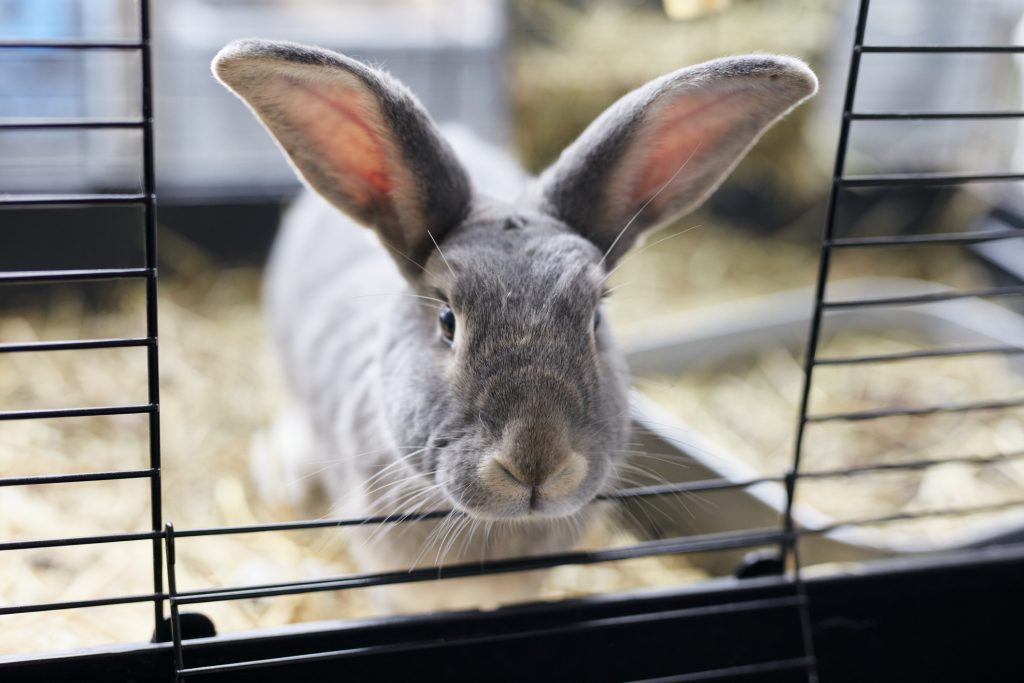The Beginner’s Guide to Raising Rabbits
From setting up the right habitat to providing them with the proper diet, learn all the basics to caring for rabbits.
From setting up the right habitat to providing them with the proper diet, learn all the basics to caring for rabbits.

Whether you’re considering adopting a bunny or have recently welcomed one into your home, understanding the basics of rabbit care is crucial to ensuring a happy and healthy life for your furry friend.
From setting up a comfortable habitat to learning their dietary needs and grooming essentials, there are many important things you need to know when it comes to raising rabbits. With this guide from Blain’s Farm & Fleet, you can become a confident rabbit owner.
The first thing you need to decide is whether you want to house your rabbit indoors or outdoors. The best place to house pet rabbits is indoors, as being outside makes them more susceptible to predators and diseases.
If you do decide to keep them outside, make sure they’re still sheltered from all the elements. You’ll also want to ensure they have lots of extra bedding when cold temperatures hit. We suggest using straw. If it gets below freezing, it’s best to move them to a more sheltered area, such as a shed or garage.
Make sure you get a pen or hutch that’s large enough for your rabbit to get plenty of exercise. Many standard cages you’ll find won’t be big enough. The pen should be at least three by four feet. There should be more than enough room for your rabbit to run around, stand up on their hind legs, and stretch out when lying down.
Also consider the floor of their pen. It should be clean and smooth. Never use a cage with a wire bottom. This can lead to foot issues and sores.
And make sure the pen is well ventilated to avoid pneumonia and other health problems.
It’s also best to build a rabbit run. This will protect your rabbit, while still giving them plenty of room to stay active outside.
If you have an indoor rabbit, it’s still a good idea to let them run around outside to get regular exercise. And a run is the perfect place for them to do this. If your run isn’t in a shaded area, we suggest building a roof over it to protect them in sunny, hot weather.
If you’re housing your rabbit in your home, keep them in a bunny-proofed, quiet space rather than allowing them to freely walk around. If you have other pets, always keep them away from your rabbit.
You should give rabbits unlimited access to grass and hay, as this is a large part of their diet. However, you should also accompany it with rabbit feed pellets. They should be 16% to 18% protein and 16% to 21% fiber and are good for young rabbits and mature rabbits alike.
Make sure you do not overfeed your rabbits, as this could lead to health issues. If your rabbit is less than four pounds, aim to give them no more than 1/4 cup of pellets per day. Otherwise, give your rabbit an additional 1/4 cup for every extra two pounds they weigh. As a special treat, you can feed them low-sugar vegetables, such as leafy greens, on occasion.
You should also provide your rabbit with fresh water all the time. Make sure you change their water every day, which will help avoid bacteria growth. While some rabbit owners prefer to use sipper bottles for their bunnies, we recommend using a water bowl instead. Water bowls are easier to clean, don’t collect as many germs, and hold more water than a sipper bottle.
To keep your rabbits happy and healthy and keep odors at bay, make sure you’re regularly cleaning their living area. You should keep a litter box in the area of their enclosure where they prefer to use the bathroom. Plan to scoop out the litter box daily, and empty it completely every one to three days.
It’s important to remember that when you’re cleaning the litter box, only get rid of the hard fecal pellets. Do not scoop out the soft cecotropes, as your rabbits needs these to properly digest their food.
You should clean the enclosure itself at least once a week using white vinegar, and remove any dirty bedding daily. You should also wash their food and water bowls on a daily basis, and replace old food with fresh stuff.
If you have a rabbit, you must commit to giving them plenty of attention, as they’re social animals. Gently pick them up often. The more you do this, the more comfortable they’ll be with getting held.
Rabbits also need to be brushed at least once a week. However, if you have a wool rabbit, you should brush them every day. Make sure you gently get rid of any mats in their fur, and especially around their feet. Rabbits have delicate skin, so be very careful when doing this.
If you don’t want to brush them daily, you can also choose to shear their coats.
You should also make sure that either you, your veterinarian, or a groomer trims your rabbit’s nails when necessary.
You’ll want to avoid giving your rabbit baths. Rabbits typically do not enjoy being bathed, and they can get extremely scared or shocked if you try it. Baths aren’t necessary for rabbits anyways, as they do a good job of grooming themselves. If you do notice a dirty spot on your bunny, carefully clean it with a washcloth.
For more guides and how-tos like this one, check out our Small Animals Blog.